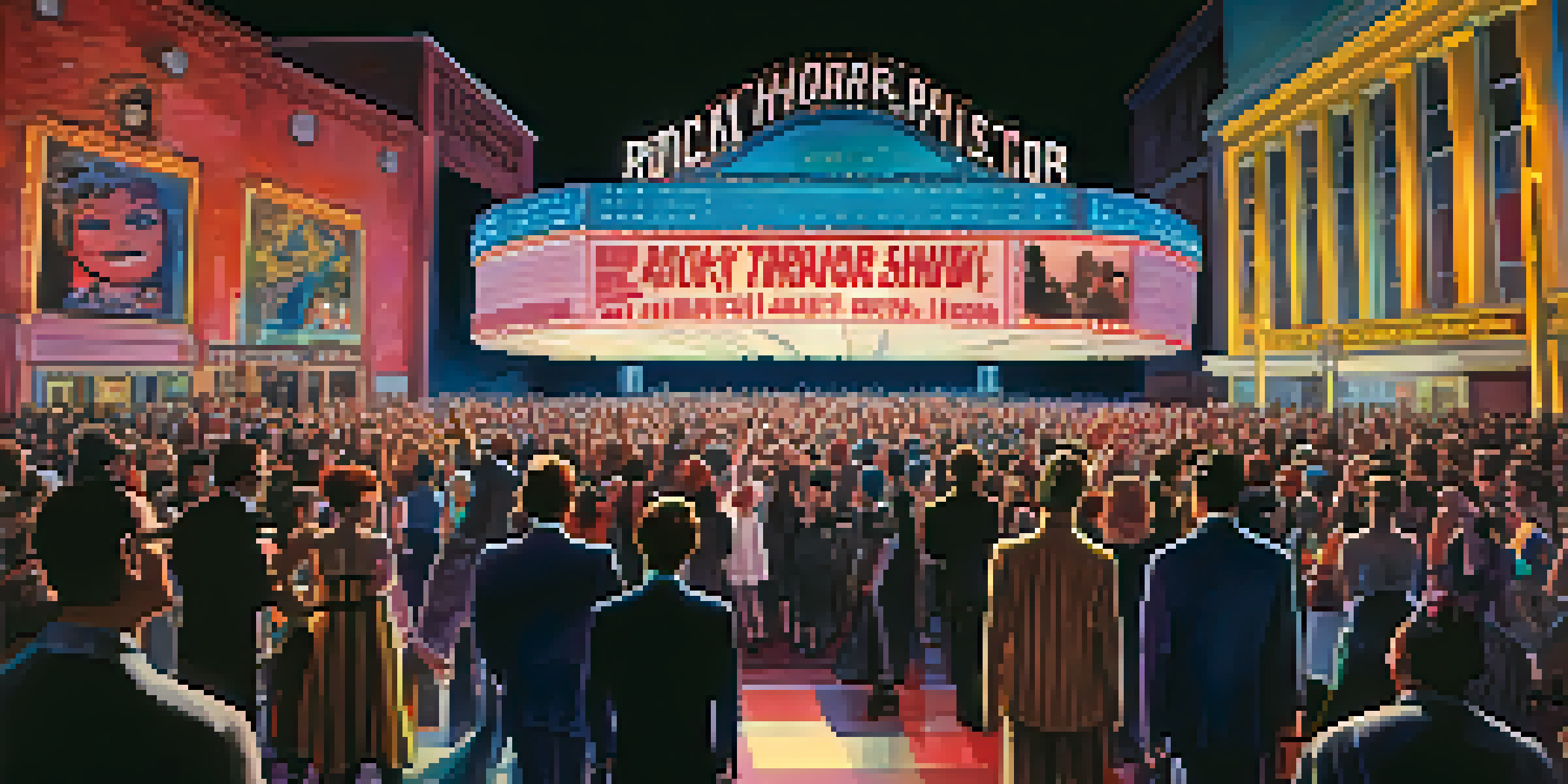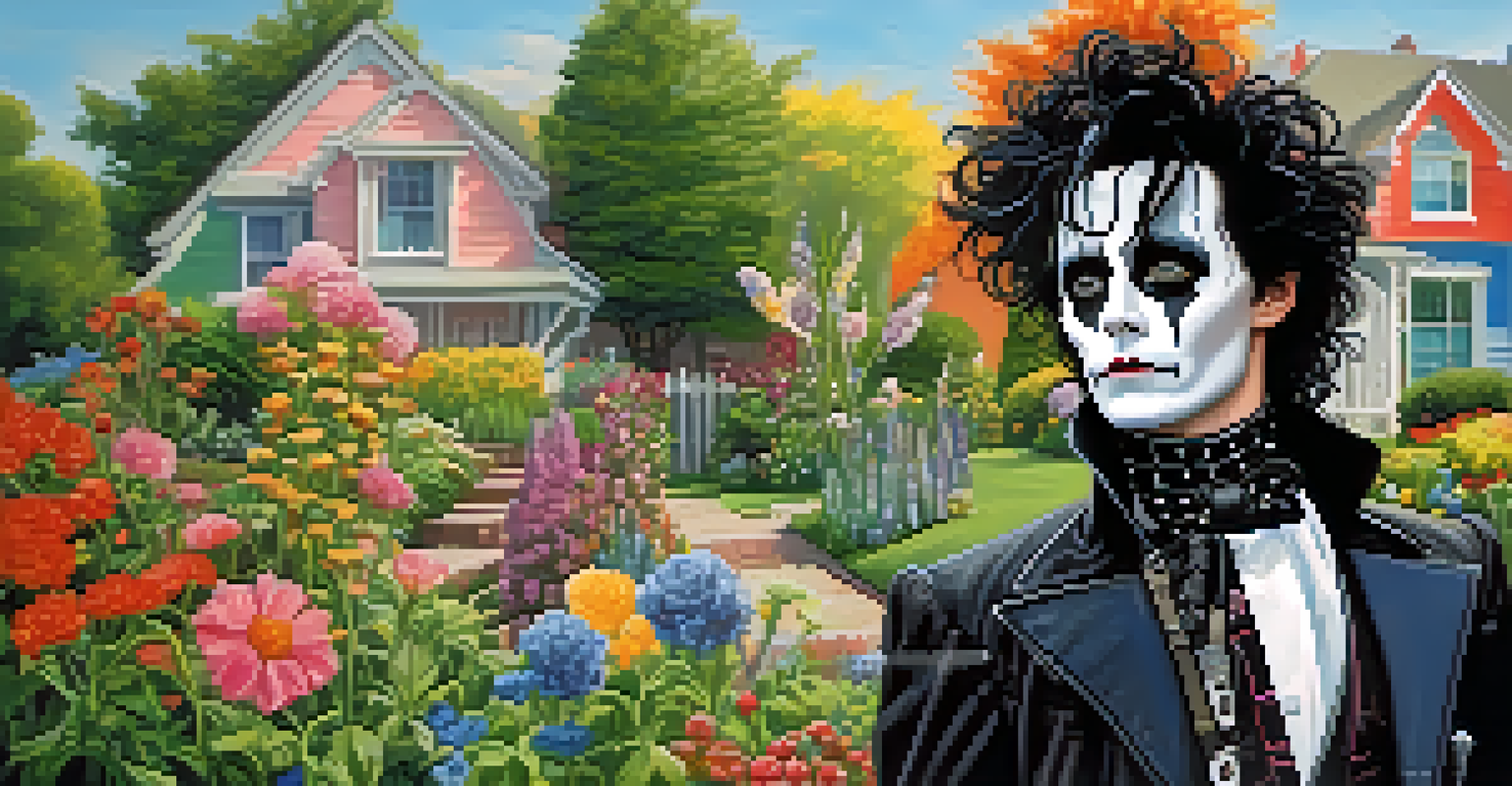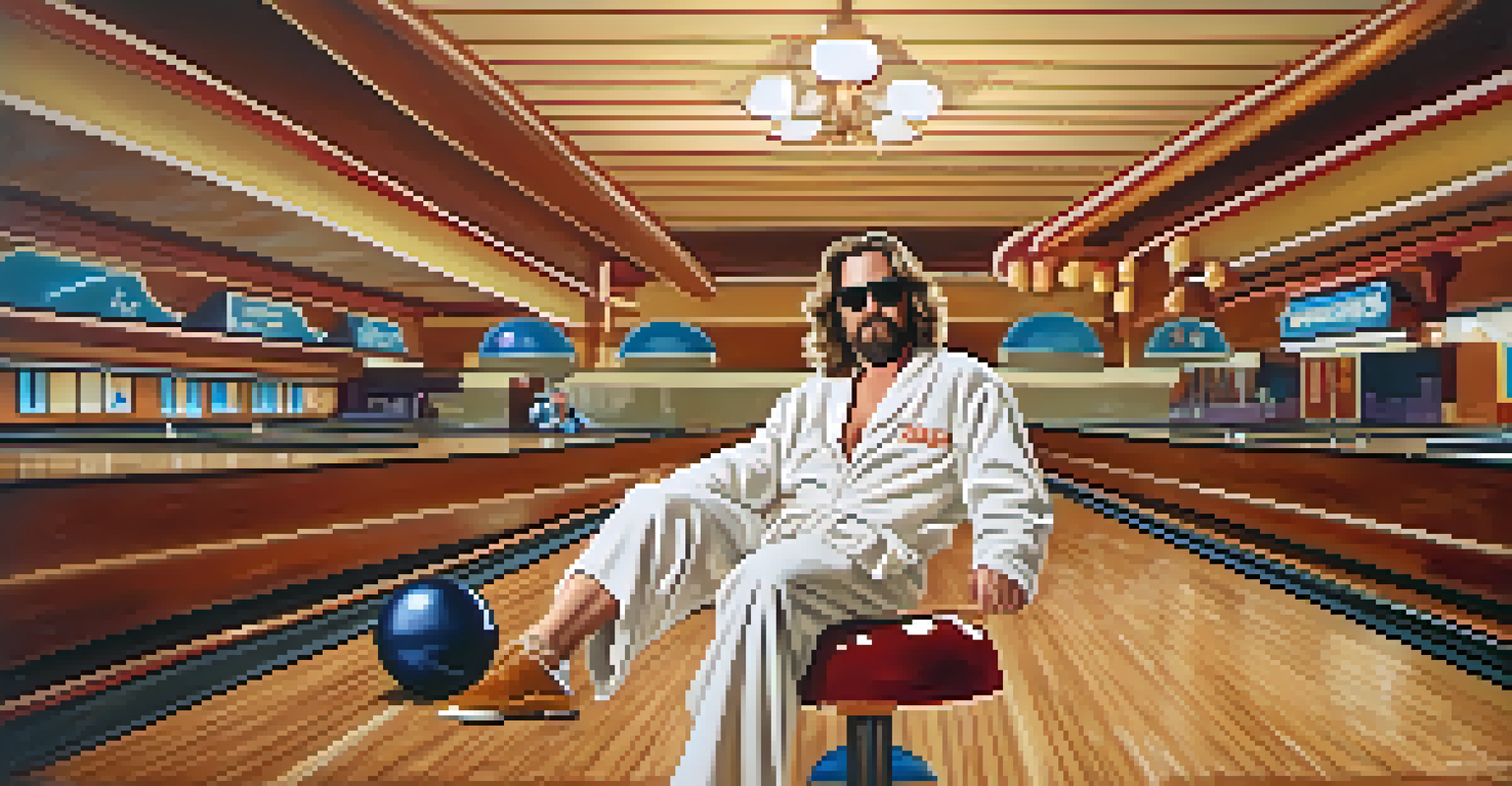Iconic Characters in Cult Classics: A Deep Dive

Defining Cult Classics: More Than Just Movies
Cult classics are films that, despite initial box office struggles, gain a devoted following over time. These movies often feature unconventional stories or characters that resonate deeply with specific audiences. Think of them as the underdogs of the film industry, proving that popularity doesn't always equate to quality. Their unique appeal often lies in their quirky narratives or memorable performances that stick with viewers long after the credits roll.
Cinema is a matter of what's in the frame and what's out of it.
What sets cult classics apart from mainstream hits is their capacity to create a community among fans. For instance, movies like 'The Rocky Horror Picture Show' encourage audience participation, becoming events rather than just screenings. This sense of belonging fosters a strong emotional connection, making these films a significant part of fans' identities. It's not just about watching a movie; it's about sharing an experience with others who appreciate the same eccentricities.
Ultimately, cult classics challenge the norms of filmmaking and storytelling, paving the way for innovative ideas. They remind us that the beauty of cinema lies in its diversity, and it teaches us to embrace the unconventional. As we delve into the iconic characters that inhabit these films, we’ll see how they reflect the themes of rebellion, identity, and passion that resonate with audiences worldwide.
The Quirky Charm of The Dude in 'The Big Lebowski'
Jeff Lebowski, affectionately known as 'The Dude,' is one of the most iconic characters in cult cinema. With his laid-back attitude and love for bowling, The Dude embodies a unique philosophy of life that prioritizes relaxation and simplicity. His famous mantra, 'The Dude abides,' has become a rallying cry for those who seek to take life a little less seriously. This character's appeal lies in his nonconformity, making him relatable to anyone who feels out of place in a fast-paced world.

The film itself, directed by the Coen Brothers, mixes elements of noir, comedy, and absurdity, creating a rich tapestry that allows The Dude to shine. His interactions with the eclectic cast of characters—such as Walter and Donny—showcase how friendships can form even in the most bizarre circumstances. Each character adds layers to the narrative, making it a cult classic that invites multiple interpretations. The Dude's journey through a series of misadventures highlights the absurdity of life, resonating with viewers who appreciate its humor and depth.
Cult Classics Create Community
Cult classics foster a sense of belonging among fans, turning viewings into shared experiences.
Moreover, The Dude’s character has transcended the film, becoming a cultural icon. From fashion trends inspired by his laid-back style to various references across pop culture, The Dude represents a lifestyle that embraces individuality. He reminds us that sometimes, it's perfectly fine to take a step back and let life unfold at its own pace. This legacy solidifies his position as a quintessential figure in the realm of cult classics.
Marty McFly: A Time-Traveling Icon in 'Back to the Future'
Marty McFly, played by Michael J. Fox, is the quintessential teenager who finds himself in extraordinary circumstances. In 'Back to the Future,' he travels back in time to 1955, inadvertently altering his own existence. This classic blend of science fiction and comedy showcases the relatable struggles of adolescence, such as fitting in and finding one's identity. Marty’s character resonates with anyone who has ever felt out of place, making him a timeless figure in cinema.
Film is a powerful medium because it can change people's perceptions and beliefs about the world.
The film's clever writing and engaging plot highlight Marty's resourcefulness and courage as he navigates through time. His interactions with iconic characters, like Doc Brown and his parents, add depth to the narrative and create memorable moments. The tension of trying to ensure his own future while dealing with the complexities of past relationships is a theme that many viewers can relate to. Through his journey, Marty teaches us about the importance of choices and the impact they have on our lives.
Marty McFly's influence extends beyond the film itself, as he has become a symbol of the 1980s pop culture phenomenon. His iconic hoverboard and signature denim jacket are recognized even by those who haven’t seen the movie. The character's adventurous spirit inspires generations to embrace curiosity and adventure. In the realm of cult classics, Marty McFly stands as a beacon of youthful exuberance and the power of friendship across time.
The Dark Allure of Edward Scissorhands
Edward Scissorhands, brought to life by Johnny Depp, is a character that embodies both beauty and tragedy. With his scissors for hands, Edward represents the struggle between isolation and the desire for connection. His gentle nature and artistic soul clash with the fear and misunderstanding he encounters in suburban life. This poignant portrayal invites viewers to reflect on the themes of acceptance and the complexity of human emotions.
Tim Burton’s whimsical direction creates a visually stunning world that enhances Edward’s character. The contrast between Edward's gothic appearance and the colorful, cookie-cutter suburbia serves to highlight his outsider status. Through Edward’s interactions with the townspeople, the film explores how society often shuns those who are different. This narrative resonates deeply, reminding us of the importance of empathy and understanding in a world that can be quick to judge.
Iconic Characters Challenge Norms
Characters like The Dude and Edward Scissorhands encourage individuality and self-acceptance.
Edward Scissorhands has become a beloved figure in pop culture, symbolizing the beauty of the misunderstood. His story encourages us to embrace our uniqueness and to look beyond appearances. The film’s enduring legacy lies in its ability to evoke empathy and inspire conversations about acceptance. Edward’s character continues to be celebrated for his depth and emotional resonance, solidifying his place in the pantheon of cult classic icons.
The Unforgettable Experience of 'The Rocky Horror Picture Show'
'The Rocky Horror Picture Show' is not just a film; it's a cultural phenomenon that has left an indelible mark on audiences. With its catchy songs and flamboyant characters, the movie invites viewers to let loose and embrace their true selves. The story of Brad and Janet navigating a world of sexual liberation and eccentricity challenges societal norms, making it a beacon for those seeking acceptance. This interactive experience, where fans dress as characters and participate, creates a vibrant community around the film.
Tim Curry's portrayal of Dr. Frank-N-Furter is particularly iconic, blending charisma and camp to challenge traditional gender roles. His character's flamboyance and unapologetic nature resonate with audiences who appreciate individuality and self-expression. The film’s celebration of nonconformity and the exploration of identity have cemented its status as a cult classic, providing a safe space for those who feel marginalized. Through its outrageous humor and bold themes, 'Rocky Horror' has cultivated a loyal fanbase that spans generations.
The legacy of 'The Rocky Horror Picture Show' goes beyond just being a movie; it has become a rite of passage for many. Midnight screenings and audience participation events create an electric atmosphere that brings fans together in celebration of their shared love. This unique experience transforms the film into something more profound, fostering connections that are built on acceptance and joy. Ultimately, the film and its characters encourage viewers to break free from societal constraints and embrace their true selves.
The Eccentricity of Beetlejuice: A Lesson in Chaos
Beetlejuice, played by Michael Keaton, is the embodiment of chaotic energy in Tim Burton's film of the same name. His wild antics and outrageous personality bring a unique blend of humor and horror, making him a standout character in cult classic cinema. The film's premise revolves around a recently deceased couple attempting to scare away the new living occupants of their home, and Beetlejuice becomes their eccentric ally. His unpredictable nature keeps viewers on their toes and adds an element of fun.
The character of Beetlejuice showcases the power of creativity and imagination, as he bends the rules of reality. His memorable catchphrases and quirky appearance, complete with stripes and wild hair, have ensured his place in pop culture. The film’s blend of dark humor and whimsy invites viewers to embrace the absurdity of life and death. This combination creates a lasting impact, as audiences are drawn to Beetlejuice’s larger-than-life personality.
Timeless Themes Resonate Across Generations
The enduring legacies of these films highlight the power of storytelling to inspire and provoke thought.
Moreover, Beetlejuice's influence extends beyond the film, inspiring countless references and parodies in media. His character represents a celebration of nonconformity, encouraging viewers to embrace their quirks. This legacy reinforces the idea that chaos can be both entertaining and liberating. Ultimately, Beetlejuice serves as a reminder that life's unpredictability can lead to delightful surprises and unforgettable experiences.
The Enduring Legacy of Iconic Cult Characters
Cult classic characters leave a lasting impression on audiences, becoming integral to the films they inhabit. These characters often challenge societal norms and encourage viewers to think differently. Through their quirks and idiosyncrasies, they embody themes of individuality, acceptance, and rebellion, resonating deeply with fans. The legacy of these characters extends far beyond their films, influencing fashion, art, and even social movements.
As we reflect on characters like The Dude, Marty McFly, and Edward Scissorhands, we see that their stories offer more than entertainment; they provoke thought and inspire change. Each character invites viewers to embrace their true selves, fostering a sense of belonging within their respective fan communities. This emotional connection solidifies their status as icons in the world of cult classics. They remind us that it's perfectly okay to be different and that our uniqueness is what makes us special.

Ultimately, the impact of iconic characters in cult classics is profound. They provide an escape from reality while encouraging self-expression and acceptance. As we continue to explore these beloved films, their characters will undoubtedly remain a source of inspiration and joy for future generations. The legacy of these cult classics is a testament to the power of cinema to unite, entertain, and challenge societal norms.